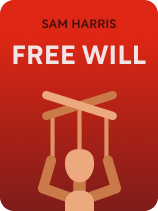

This article is an excerpt from the Shortform book guide to "Free Will" by Sam Harris. Shortform has the world's best summaries and analyses of books you should be reading.
Like this article? Sign up for a free trial here.
If free will is an illusion, does that mean that we must be disillusioned? Can we still somehow have a sense of self and agency?
Sam Harris argues that we don’t have free will. But, he doesn’t believe that accepting free will as an illusion—which requires a major shift in perspective for many of us—has to undermine everything we believe about ourselves and others.
Keep reading to discover three ways Harris says we can maintain a sense of agency even in the absence of free will.
#1: Recognize That You Can Still Think Deliberately
First, Harris recommends recognizing the crucial role that deliberate thought plays in your life. He explains that, while it’s true that you don’t cause your thoughts or choices, it’s also true that you have to think and deliberate to make certain kinds of decisions or plans. (Some choices, like picking a bagel or oatmeal for breakfast, can happen almost automatically. But, that’s not true for complex decisions like choosing which neighborhood to live in.) Harris writes that you can choose to think deliberately or to focus your attention on a specific question or decision. Even if you don’t have ultimate control over the thoughts that you think, he recommends recognizing that you still do need to think and deliberate.
(Shortform note: Other experts agree with Harris’s idea that, to maintain a sense of agency, we need to use our capacity for conscious deliberation when we have important decisions or plans to make. But, how exactly can we enhance our ability to do this deliberate kind of thinking? Neuroscientist Anne-Laure Le Cunff recommends a few strategies for becoming a more effective thinker: analyzing your own cognitive process, becoming aware of your cognitive biases, consciously avoiding logical fallacies and shortcuts, considering the second-order consequences of your decisions, studying and designing mental models, and building emotional resilience so you can keep your feelings from affecting your judgment.)
#2: Become More Aware of the Causes of Your Feelings and Actions
Second, Harris recommends gaining more control over your life by tuning in—and responding—to the external influences that affect how you feel and act. He explains that, while it’s impossible to recognize all of these outside factors, you can identify and respond to some of them. For example, you might notice that you find it difficult to focus when you work from home and attribute your lack of productivity to a shortfall of skill or motivation. But, if you take a closer look and realize that your desk is cluttered, the room is poorly lit, and the sound of construction next door is distracting, then you can take steps to change your environment. Those changes can improve your concentration and therefore your behavior and help you maintain a sense of agency.
(Shortform note: Becoming aware of the many influences that shape your thoughts and decisions is easier said than done. But in The Compound Effect, Darren Hardy offers some practical advice for understanding and addressing these external forces. Hardy identifies three types of influences: the messages that your brain processes, the people you associate with, and your environment. He recommends paying attention to the media and ideas you consume, being intentional about the people you spend your time with, and clearing up physical and psychic clutter so that you can live in a more positive environment.)
#3: Realize That Your Choices Still Matter
Third, Harris advises acknowledging that, even if you don’t make your choices freely, those choices are still important. Even though each decision you make is determined by outside causes and events, your choices still matter. He explains that we still have control over doing what we decide to do (even though we aren’t in control of the decision we made in the first place). In other words, once you’ve made a decision based on your intentions, you’re in control of acting according to that decision. That gives you a sense of agency. For example, if you’ve decided to eat a healthy dinner, you can control your actions by selecting and consuming nutritious food.
(Shortform note: Some experts consider Harris’s views on self-control contradictory. Philosopher Richard Carrier notes that when Harris contends that we can gain more control over our decision-making, he contradicts his argument that we don’t have free will. Carrier argues that this signals that Harris’s definition of free will might be too narrow. The disagreement illustrates just how difficult free will is to define and study. Physicist Marcelo Gleiser notes that each time we choose how to define or analyze free will, we take the risk of reducing the nuances of our decision-making too far. Gleiser contends that in reality, the question of whether we have free will probably can’t be answered “yes” or “no”: Being human is more complicated than that.)

———End of Preview———
Like what you just read? Read the rest of the world's best book summary and analysis of Sam Harris's "Free Will" at Shortform.
Here's what you'll find in our full Free Will summary:
- That free will is an illusion that you should abandon altogether
- How our thoughts, feelings, and desires are caused by outside influences
- Why putting effort into decisions matters, even if they're predetermined






